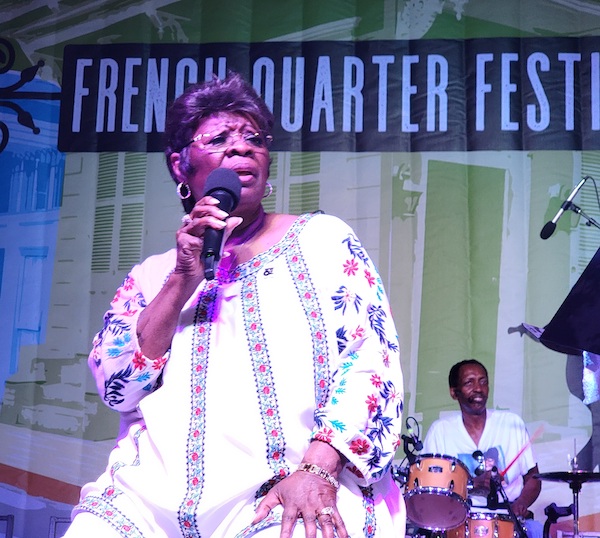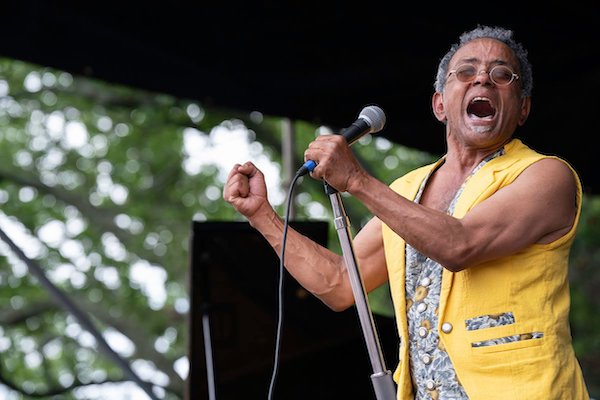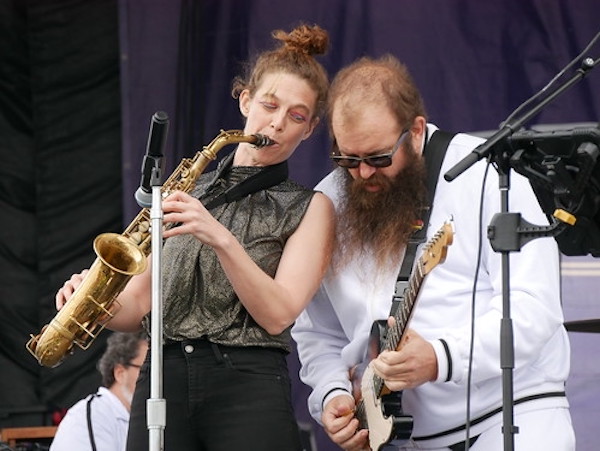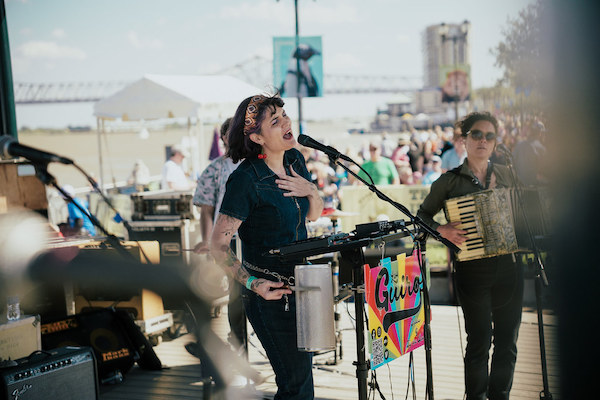Music Feature: New Orleans French Quarter Festival, 2024
By Jon Garelick
Some at times sentimental observations of New Orleans’s other massive music confab, the French Quarter Festival.

Irma Thomas at the French Quarter Festival. Photo: Cedric Ellsworth
“Time has really been on my side,” Irma Thomas declared. “For those of you who have not done your homework, I’m singing Irma, not the Rolling Stones. They got it from me! And the irony of it all is that they did it exactly like I did it! I’m going to see if they have selective amnesia when they come to the JazzFest. Oh yeah!”
Thomas, the “Soul Queen of New Orleans,” was speaking of course about “Time Is on My Side,” her 1964 hit (written by Jerry Ragovoy with additional lyrics by Jimmy Norman), covered by the Stones mere months after Thomas’s release. She was anticipating the Stones’ much-deferred appearance at the New Orleans Jazz & Heritage Festival, on May 2.
But this was a couple of weeks earlier, at New Orleans’s other massive music confab, the French Quarter Festival.
Irma was one of a touted 1,700 musicians performing over the four-day weekend fest (April 11-14), begun in 1984, which differs from the bigger, older JazzFest (b. 1970) in several respects, the main one being that it’s free. The French Quarter Festival, as the name implies, all takes place in the Vieux Carré, and focuses on home-based acts as opposed to the ticketed Jazz Fest (at the Fair Grounds Race Track), whose lineup includes plenty of local acts but also ranges far and wide, drawing such artists from the international touring circuit as the Stones and, in the past, Tom Petty, Stevie Nicks, Bob Dylan, Springsteen, Phish, and on and on. (For a more detailed comparison of the two festivals, see Clea Simon’s commentary.)
Of course, as a major New Orleans artist, Irma (she is a one-name icon) will also be playing Jazz Fest, and maybe even cross paths with Mick and Keef, who knows? Irma’s beef isn’t necessarily that the Stones ripped off the song — after all, she didn’t write it. But the feeling among Irma fans is that the Stones never properly acknowledged the singer for essentially giving them their first US Top Ten hit, released mere months after Irma’s, a cover so close to the original that it even included Irma’s mid-song monologue (“You’ll come running back!”).
Irma is now 82, and still singing with commanding power, if occasionally sounding a bit frayed up top. (Mick and Keith are 80). At French Quarter Fest she ran through a dozen or so hits, including “Time,” “Breakaway,” “Ruler of My Heart,” “I Done Got Over” (the last including her second-line pitch and comprising a New Orleans Mardi Gras Indian medley of “Iko Iko” and “Hey Pocky Way”). My favorite moment during Irma’s set: Four women of varied ethnicities and ages (from 70ish to 20-something) snaking down the path at the edge of the packed field, single-file, hands on shoulders, all singing the lyrics to “Anyone Who Knows What Love Is (Will Understand).”
Call me a sentimental so-and-so, but it’s moments like that that make these mass festivals worthwhile — after all, this is not a covered “shed” amphitheater concert with stadium seating. You’re out in the hot sun, and if you have a chair it’s because you carried it on your back. And, as a couple of German tourists we ran into on Royal Street one night told us, “It’s noisy!”
But not always. Away from the big stages and over-amplified bass along the Riverwalk, there are quieter moments, even when the music is loud. I saw my favorite trad band, Tuba Skinny, holding forth with perfectly balanced sound (granted, their heaviest bass dynamic came from a sousaphone, and the only “drums” came from a rubboard) on the shaded Jackson Square stage, with scattered shade trees offering some relief for the audience as well.

John Boutté at the French Quarter Festival. Photo: Scott Saltzman
On that same stage, John Boutté, treasured by New Orleanians long before the Treme theme song made him a star, delivered what amounted to a Sunday morning service. “You know what today is?” he asked the audience. “No, Sunday happens every week,” he corrected one guesser. “It’s April 14th…. The day Abraham Lincoln was assassinated. That’s when all this started.” Boutté sang “The Battle Hymn of the Republic” and dropped the lyric “He hath loosed the fateful lightning of His terrible swift sword” to a near whisper.
Boutté’s set segued between Sunday sermon and party music. “20 percent of you voted,” he said, drawing a pointing finger across the crowd. “For the governorship! And now look what we’ve got — an insurrectionist!” He sang “My Darlin’ New Orleans,” dedicated to the late NOLA singer and songwriter for whom it was a local hit, Leigh Harris, aka Li’l Queenie, who died in 2019. “I miss Li’l Queenie,” Boutté said. And somehow he made the profane sacred, as in his gentle retelling of Allen Toussaint’s “Lipstick Traces.”
Stalking the stage in bright yellow pants and sleeveless vest, Boutté, singing in his high tenor, sometimes in falsetto, called the children home, with a mix of New Orleans standards and pop Americana. He reclaimed the poetry of Steve Goodman’s “The City of New Orleans” (“And the sons of Pullman porters/And the sons of engineers/Ride their fathers’ magic carpets made of steel”). When he sang “I’ll be gone 500 miles when the day is done,” he stretched out that “is” to forestall the end of day.
And Paul Simon’s “American Song”: “I don’t know a soul who’s not been battered/ I don’t have a friend who feels at ease/ I don’t know a dream that’s not been shattered/ Or driven to its knees.” When he sang “And I dreamed I was dying/ I dreamed that my soul rose unexpectedly,” he made the extra syllables of that last word click on its consonants, drawing us in to listen.
Like I say, call me a sentimental so-and-so, but to paraphrase what was once said about another great singer, I bought everything Boutté offered on Sunday. Because, to continue that paraphrase, he was using his voice as it should be used, “just to tell us something.”
The “Treme” finale was a kind of benediction ending the service, sending everyone out dancing and smiling, if maybe through a few tears. Did I say sentimental?

Rory Danger & the Danger Dangers performing in the French Quarter Festival. Photo: Louis Crispino
It being New Orleans, there were also plenty of laughs and sheer silliness. For instance, what was Aurora Nealand trying to tell us in her guise as Rory Danger in her band Rory Danger and the Danger Dangers? Nealand is another of those New Orleans treasures (of a newer generation) who doesn’t get to the Boston area very often. She is renowned for her singing and soprano saxophone playing that draws heavily from Sidney Bechet’s book with her band the Royal Roses (who also played Quarter Fest), and also works with a more experimental outfit called the Monocle Ensemble. Here she was in high humor with a septet that leaned heavily on rockabilly in a mix of covers and originals.
But she had a greater purpose, she told us. We were here at the “Festi-hole” to observe the “Impartial eclipse of the sun,” which she said would be visible right behind us, and she pointed to the overcast Thursday sky, while also warning us that “Staring directly into another person’s soul is not advised.” She shouted lyrics with punk-rock fury, ran around the stage and into the audience, did a handstand. She got the audience to sing the imperatives of one song, replete with mimed hand gestures: “Eat! Pray! Fight! Tithe!”
I’m not sure what the “message” was here, but at the very least I think Nealand was somewhat skeptical about the hoopla around the previous week’s total solar eclipse. Like several performers that weekend, she urged the crowd to sign a petition asking the City Council to issue a call for a Gaza cease-fire.
At the other end of the mile-plus stretch of the Quarter, on the grounds of the New Orleans Mint, now home to the New Orleans Jazz Museum, we caught another example of hijinks and high musicality — the longstanding New Orleans trio the Tin Men, which guitarist and singer Alex McMurray describes as “America’s premiere guitar-washboard-sousaphone trio.” Comprising McMurray, sousaphonist Matt Perrine, and Washboard Chaz (surname: Leary), the Tin Men play their own version of roots music, mixing originals and covers, drawing from everything. “Move Upstairs” is McMurray’s Randy Newman-esque anticipation of the hereafter, but the Quarter Fest set also included their versions of riff-rock and unlikely covers, moving from the famous “Carmen” habanera (with the sousaphone “singing” the title character’s part) to Zeppelin’s “Black Dog” (replete with washboard drum breaks), and later covering maybe the second-best riff-rock tune of all time, the James Gang’s “Funk #49.”

Los Güiros at the French Quarter Festival. Photo: Noe Cugny / OffBeat
There was more — way too much more — to the 2024 Quarter Fest: singer-songwriter-cellist Helen Gillet’s all-French recital with her French Music All-Stars, playing from the second-floor courtyard balcony of the historic BK House, in a set that included folk and jazz and Serge Gainsbourg and France Gall’s yé-yé favorite “Laisse Tomber”; Los Güiros, playing Peruvian chica, whose driving clip-clop dance grooves were reminiscent of Colombian cumbia; country-Cajun fiddle virtuoso and singing star Amanda Shaw; revered songwriter Paul Sanchez; cab driver-turned blues star Mem Shannon (favorite lyric, from his “S.U.V.”: “I’m sick of these S.O.B.s, they’re driving these S.U.V.’s, and tryin’ to run over me when I’m in my beat-up car”); and Feufollet, who deftly traversed traditional Cajun fiddle music and Americana folk-rock. (You can find live recordings in New Orleans station WWOZ’s archives.)
Lest you think this was all Family of Man rosiness, the French Quarter Festival (presented by Chevron) included a couple of reminders of the real world (aside from the presenter’s name and Mem’s lyric). There were, of course, the requisite bag checks at entry points, for which I was grateful, in these days of “soft target” paranoia. (A mass shooting took place at a New Orleans club the night before we left, killing one person and wounding 11 others.) And as we walked to the festival grounds one day, we saw a man wearing a “Raised by Reagan” tee-shirt, with a silk screened image of the Great Communicator.
I’d rather remember the Royal Street show by the trad all-female Shake ’Em Up Jazz Band, where a man in the audience wearing a Bob Marley T-shirt laughed at every other line of Bessie Smith’s bawdy “Sugar in My Bowl,” sung (unamplified) by the band’s Marla Dixon, as if he were hearing it for the first time. Dixon, a formidable trumpet player as well as vocalist, was another great discovery this year. And I’ll remember that man’s smile and laughter for a long time.
Jon Garelick can be reached at garelickjon@gmail.com.

“Eat! Pray! Fight! Tithe!” i musta been standing five people away from you. Aurora was also exquisite playing with Tim Berne’s Sunny Four in Bywater that week.